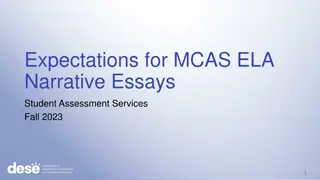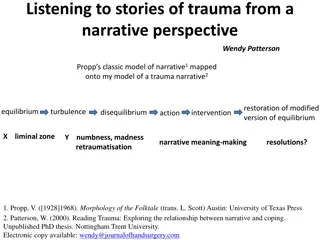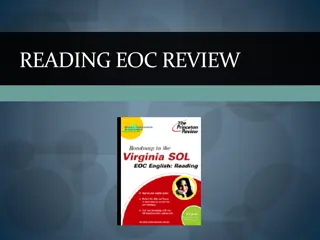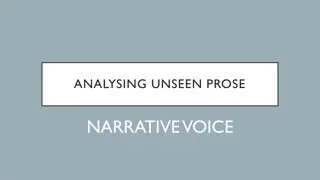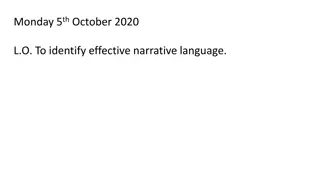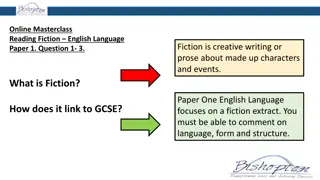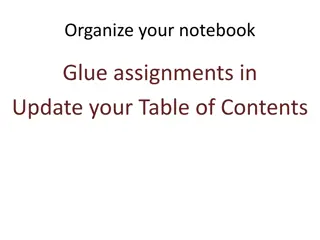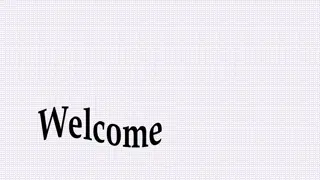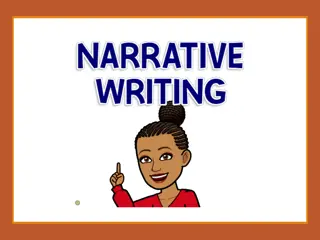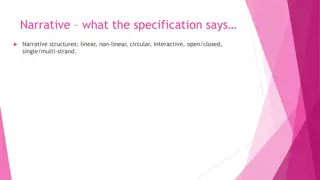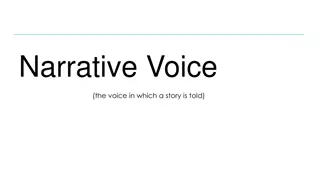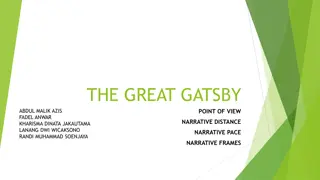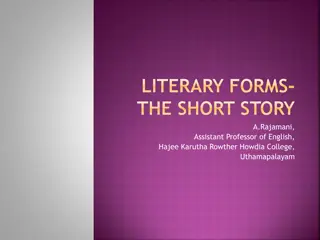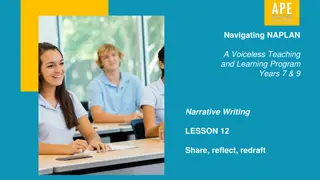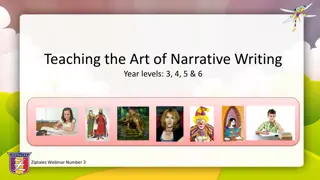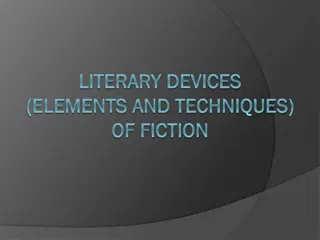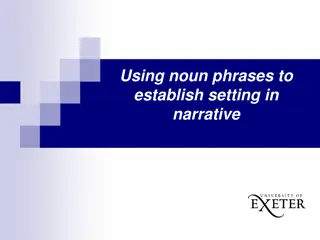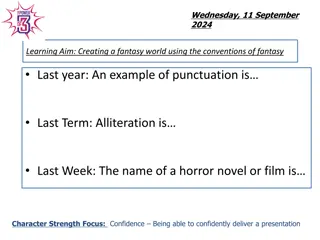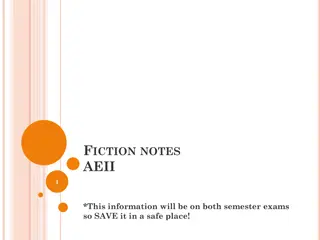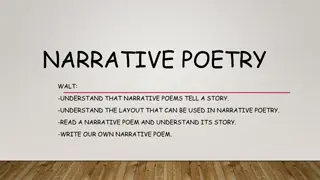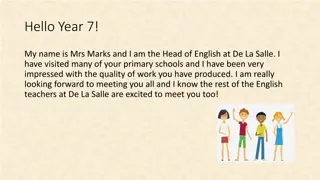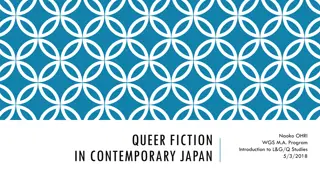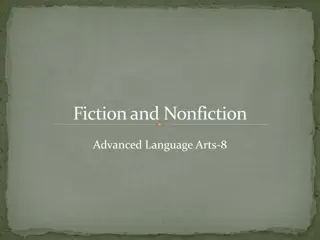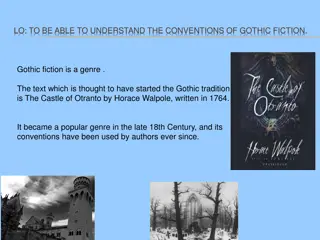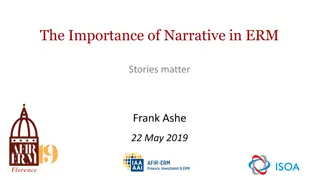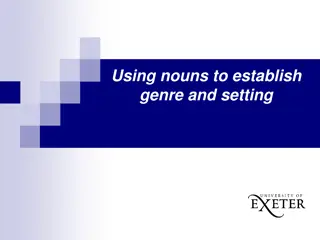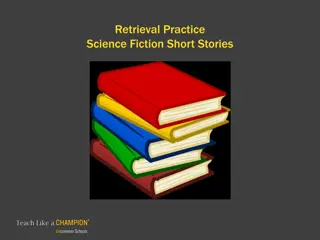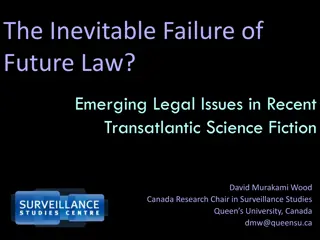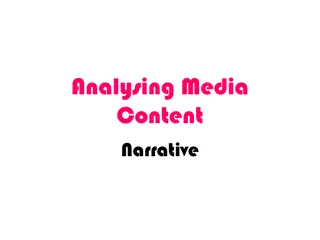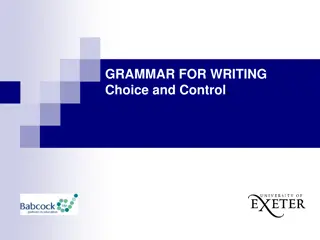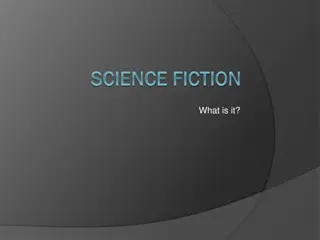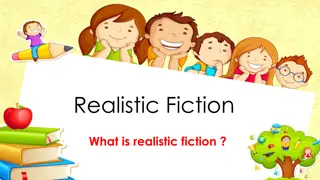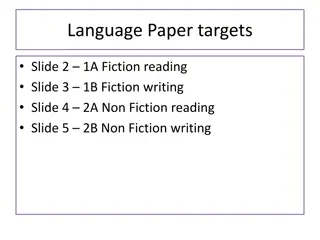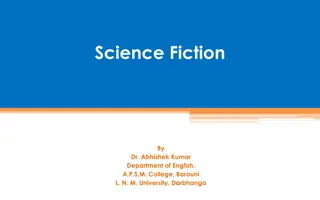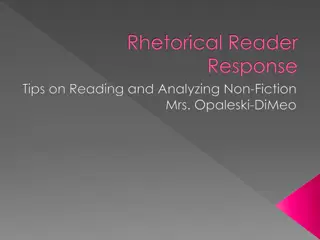Exploring Citizen Journalism and Non-Fiction Writing
Explore the world of citizen journalism and non-fiction writing, learning about text types, adapting writing to conventions, considering audience, purpose, and tone. Discover the significance and usefulness of non-fiction writing, and delve into creating various text types. Uncover the role of citiz
1 views • 11 slides
MCAS ELA Narrative Essay Expectations and Examples
Learn about the expectations for MCAS ELA narrative essays, including guidelines for idea development and conventions. Find out how to score well by responding in the correct writing mode and avoiding common mistakes. Explore examples of lower-score responses and how to improve them. Download sample
3 views • 10 slides
Understanding Trauma Narratives: A Narrative Perspective
Exploring trauma narratives through the lens of Wendy Patterson Propp's classic narrative model, this study delves into the restoration of equilibrium, the disruption of disequilibrium, and the intervention actions within the liminal zones of trauma narratives. It emphasizes narrative meaning-making
5 views • 5 slides
Reading EOC Review: Test Structure, Types of Selections, and Breakdown
The Reading EOC Review covers the test makeup, types of reading selections, and breakdown of questions and content to help you prepare effectively. The test comprises sections with 55 scored questions to be answered, focusing on functional literacy and narrative/fiction elements, including poetry, p
8 views • 26 slides
Understanding Narrative Perspective in Unseen Prose Narratives
Explore the narrative voice in unseen prose narratives through the analysis of different narrative perspectives, such as homodiegetic and heterodiegetic narrators. Understanding these terms helps in interpreting the impact of perspective on storytelling and themes in literary texts for exam preparat
1 views • 17 slides
Exploring Effective Narrative Language for Writing Success
Delve into the art of crafting compelling narratives by identifying and utilizing effective narrative language techniques. Explore the elements that make a good narrative, practice identifying literary techniques, and understand the impact of figurative language on storytelling. Enhance your writing
0 views • 42 slides
Understanding Fiction Through Text Analysis: Paper 1 English Language Masterclass
Delve into the world of fiction through an analysis of the novel "Girl With a Pearl Earring". Explore how language, form, and structure are used in the extract to captivate readers. Discover the characters, setting, and narrative techniques employed by the writer to engage and intrigue readers. Unco
2 views • 7 slides
Exploring Historical Fiction: Elements and Examples
Discover the essence of historical fiction, its key elements, and examples like "Forrest Gump." Learn how plausibility and interpretation play pivotal roles in creating captivating narratives that blend fiction with historical events.
0 views • 11 slides
Exercise in Narrative Style Transformation
Practice transforming narrative styles in storytelling through a series of examples where dialogues are rewritten into narratives. The exercises focus on changing direct speech into indirect speech while maintaining the essence of the original conversations. Each task presents a scenario followed by
1 views • 26 slides
Mastering Narrative Writing: Techniques and Sequences
Enhance your narrative writing skills by engaging readers with compelling characters and settings, developing well-structured event sequences, and utilizing descriptive details and narrative techniques effectively. Explore different points of view and learn to create engaging narratives that captiva
1 views • 23 slides
Understanding Narrative Research Design in Qualitative Research
Narrative research is a qualitative research approach that focuses on sharing individuals' stories. Researchers collect and interpret personal narratives to understand individual experiences. Key characteristics, data collection methods, steps, and ethical considerations in narrative research are ex
0 views • 20 slides
Understanding Narrative Structures in Media: Linear vs. Non-Linear
Explore the concepts of linear and non-linear narrative structures in media storytelling, analyzing how they are used to engage audiences effectively. Dive into well-known stories like Alice in Wonderland, Hansel and Gretel, and Jack and the Beanstalk to understand the difference between narrative a
0 views • 17 slides
Understanding Narrative Voice in Fiction Writing
Explore the elements of narrative voice in fiction writing, including tense, perspective, and language choices. Learn how authors decide on the tense and perspective for their stories, and consider different language styles that suit various characters and perspectives. Discover the nuances of first
1 views • 7 slides
Understanding Narrative Elements in "The Great Gatsby
Explore the narrative elements in "The Great Gatsby" such as point of view, narrative distance, and narrative pace. The novel is analyzed from chapters 5 to 9, focusing on Nick Carraway's first-person perspective and the small narrative distance, which adds realism to the story.
0 views • 11 slides
Understanding Narrative Techniques for Effective Storytelling
Explore different narrative techniques like first-person perspective, flashback, framed narrative, foreshadowing, and in medias res to enhance your storytelling skills. Learn how these techniques can bring depth and complexity to your narratives, captivating your audience with engaging storytelling
3 views • 13 slides
Understanding the Art of the Short Story
A short story is a concise narrative that captivates readers with a focused theme and structured plot. This literary form demands unity of purpose and a single informing idea, distinguishing it from a novel. Various perspectives exist on the composition of a short story, with debates on its length,
1 views • 10 slides
NAPLAN Year 7 & 9 Narrative Writing Lesson: Share, Reflect, Redraft
Explore a voiceless teaching program for NAPLAN Years 7 & 9 narrative writing in Lesson 12. Dive into assessment criteria, NAPLAN minimum standards for Year 7 and 9, and resources from the National Assessment Program. Enhance your narrative writing skills through sharing, reflection, and redrafting.
0 views • 5 slides
Mastering Narrative Writing: Tips for Year Levels 3-6
Dive into the art of narrative writing focusing on Year Levels 3 to 6. Explore the importance of narratives in children's lives, the inclusion of narrative in the Australian Curriculum, understanding what truly constitutes a story, and engaging activities to spark creativity in students.
0 views • 25 slides
Understanding Narrative Stories and Plot Structure
A narrative text is a story composed of various elements such as characters, setting, conflict, events, climax, and resolution. The structure of a narrative story can be dissected into parts like beginning, middle, and end, each serving a specific purpose in storytelling. By plotting the story on a
0 views • 13 slides
Explore Literary Devices and Elements of Fiction
Dive into the world of literary devices and elements of fiction, including setting, mood, plot, flashback, and foreshadowing. Understand how sensory details enhance writing and learn about techniques such as allusion, figurative language, and more. Discover the significance of these elements in shap
1 views • 28 slides
Exploring Setting Through Noun Phrases in Narrative Descriptions
Establishing setting in narrative through the use of descriptive noun phrases is crucial for creating a vivid and immersive atmosphere. By carefully selecting and arranging nouns, authors can evoke specific moods and engage readers in a detailed visual experience. This approach enhances the overall
1 views • 6 slides
Exploring Fantasy Worlds: Conventions, Types, and Challenges
Dive into the realm of fantasy literature and learn about the conventions, types, and differences between fantasy and sci-fi. Uncover the definition of fantasy, explore popular genres, and discover sub-genres like fiction, science fiction, and historical fiction. Engage in thought-provoking challeng
0 views • 17 slides
Understanding Fiction: Essential Plot and Character Elements
Dive into the world of fiction with this comprehensive guide that covers essential elements such as plot structure, character development, conflict types, setting descriptions, and narrative perspectives. Learn about the key components of storytelling and how they shape engaging narratives. Save thi
0 views • 16 slides
Washington Irving: Father of American Fiction and Pioneer of American Romanticism
Washington Irving, an influential American author of the early 19th century, is revered as the Father of American fiction. Known for iconic works like "The Legend of Sleepy Hollow" and "Rip Van Winkle," Irving played a crucial role in establishing American literature as an independent art form. His
1 views • 14 slides
Dive into Narrative Poetry
Explore the essence of narrative poetry by understanding its storytelling nature, layout, features, and common poetry techniques. Delve into an example poem, "Skippy the Naughty Kangaroo," to grasp the main characters, narrative elements, and the story it conveys. Through this journey, you'll enhanc
0 views • 11 slides
Exploring Fiction Texts: Analyzing Story Openings
Delve into the art of analyzing fiction texts through the perspective of storytelling techniques, character narratives, and structural decisions made by writers to captivate readers. Understand the impact of narrative voice, tense usage, and sentence structures on creating engaging story introductio
0 views • 10 slides
Exploring Japanese Queer Fiction: A Contemporary Perspective
Delve into the world of Japanese queer fiction through this course introducing the evolution of queer storytelling in contemporary Japan. Discover literary works, critical analysis, and cultural backgrounds shaping the narrative landscape of Japanese queer literature.
0 views • 12 slides
Understanding Fiction and Nonfiction in Language Arts
Fiction and nonfiction are two key genres in literature. Fiction involves imaginative storytelling with elements like plot, characters, setting, point of view, and theme. Nonfiction, on the other hand, deals with real people, events, and ideas, aiming to inform, persuade, or entertain readers. Explo
0 views • 14 slides
Understanding Gothic Fiction Conventions in Literature
Gothic fiction is a captivating genre rooted in dark, mysterious settings, supernatural elements, and eerie atmospheres. Originating with "The Castle of Otranto" by Horace Walpole, this genre has evolved to encompass elements like family curses, isolated castles, and sinister creatures. Dive into th
0 views • 25 slides
The Power of Narrative in ERM and Economics
Narrative plays a crucial role in risk management, as it helps in better understanding and decision-making. The use of stories in risk dashboards and economic narratives can convey complex information effectively. Robert Shiller's concept of narrative economics explores how popular stories impact ec
0 views • 27 slides
Creative Noun Usage in Science Fiction Writing
Explore the art of using nouns to establish genre, setting, and character names in science fiction writing. Learn how authors like Philip Reeve utilize proper nouns to create immersive worlds and unique characters. Delve into the significance of authentic text, discussion, and purposeful learning pr
0 views • 10 slides
Science Fiction Retrieval Practice: Short Stories Insights
Explore futuristic technologies, incongruity, and speculative fiction elements in science fiction short stories like "Robbie" and "There Will Come Soft Rains." Uncover the connections to historical events, like the Cold War, through literary analysis of these captivating narratives.
0 views • 16 slides
Exploring Legal Themes in Science Fiction: The Inevitable Failure of Future Law
This study delves into emerging legal issues in recent transatlantic science fiction works by authors like Charles Stross, Ken McLeod, and Paolo Bacigalupi. It examines the portrayal of law in SF and what insights it offers about our legal systems. Through a systematic survey of over 300 novels and
0 views • 12 slides
Understanding Narrative Structures in Media Content
Narrative in media content involves how stories are told, focusing on structure and conventions. Key elements include Todorov's narrative theory, basic narrative structures, and Propp's character spheres of action, all of which shape the way stories unfold in films and other media.
0 views • 13 slides
Teaching Writing Creatively for Narrative Fiction
Explore the principles of teaching writing creatively for narrative fiction, emphasizing the importance of engaging young writers' imaginations, emotions, and beliefs. Learn how to create an enriching environment that encourages exploration and experimentation in the writing process. Discover how ev
0 views • 71 slides
Exploring the World of Science Fiction
Science fiction is a genre that delves into imagined future scientific and technological advances, exploring major societal and environmental changes, space travel, time travel, and life on other planets. It combines elements of science and fiction to create believable yet captivating narratives tha
0 views • 14 slides
Understanding Realistic Fiction: Features and Examples
Realistic fiction is a genre of writing that portrays characters, settings, and events that could exist in real life, even though the story itself may be fictional. The key features include believable characters, realistic settings, everyday problems, and plausible solutions. By sorting book covers
0 views • 9 slides
Language Paper Targets for Fiction and Non-Fiction Reading and Writing
This content provides detailed targets for Language Papers, focusing on Fiction and Non-Fiction reading and writing skills. It covers strategies such as being specific in analysis, using evidence from texts, improving sentence structures, enhancing vocabulary usage, and applying language techniques
0 views • 14 slides
Evolution of Science Fiction Literature
Science fiction genre, blending imaginative fantasy with scientific principles, has evolved significantly over time. Initially emerging in the late 1800s, it gained popularity alongside technological advancements. Theodore Sturgeon highlighted the essence of human stories within the genre. Iconic wo
0 views • 8 slides
Effective College Reading and Analysis Strategies for Non-Fiction Texts
Enhance your non-fiction reading and analysis skills with these practical tips: prepare yourself mentally before reading, preview the article, highlight key points while reading, monitor comprehension, and summarize the article afterward. Additionally, learn how to create a rhetorical précis to eff
0 views • 19 slides

